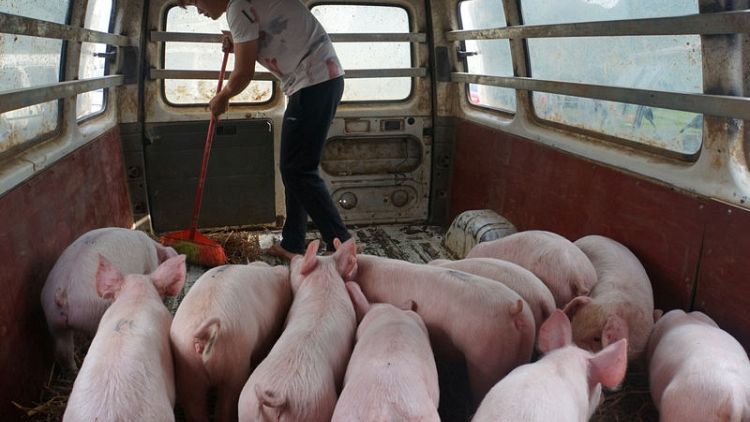By Dominique Patton and Yawen Chen
BEIJING (Reuters) - China on Friday confirmed that it will waive import tariffs for some soybeans and pork shipments from the United States, as the two sides try to thrash out a broader agreement to defuse their protracted trade war.
The tariff waivers were based on applications by individual companies, the finance ministry said in a statement, citing a decision by the country's Cabinet without specifying the quantities involved.
Several industry sources in the United States and China interpreted the announcement as official confirmation of duty exemptions on up to 10 million tonnes of soybeans and an unknown volume of pork sources said were offered to importers earlier this year.
"There's nothing that's saying this is some big addition to what's been out there," said Matt Wiegand, commodity broker for FuturesOne in Lincoln, Nebraska.
China had imposed levies in response to tariffs launched by Washington over allegations that China steals and forces the transfer of American intellectual property to Chinese firms. Tariffs on U.S. soy imports are currently 33% while levies on pork are up to 72%.
Importers with duty-free quotas have been required to pay the tariffs and later apply for refunds, a process that traders said caused delays in unloading shipments. Friday's announcement appeared to remove that step, industry sources said.
The announcement did not trigger new U.S. soy purchases on Friday, three U.S. soybean exporters said, although soybean <0#S:> and hog <0#LH:> futures firmed on the news.
The waivers come amid negotiations to conclude a 'phase one' deal to de-escalate a 17-month trade war that has roiled financial markets, disrupted supply chains and weighed on global economic growth.
Though President Donald Trump struck an upbeat tone on progress in talks on Thursday, a new round of U.S. tariffs covering about $156 billion of Chinese imports is set to kick in just over a week on Dec. 15.
"The goal (of this move) is to expand purchases and reassure the United States," said a Chinese source who advises Beijing on the trade talks but declined to be identified because of the sensitivity of the matter.
Beijing's levies on U.S. soybeans initially brought its purchases of the United States' most valuable farm export to a virtual halt, although it has offered waivers to buyers in recent months as the U.S. crop was harvested.
(Graphic: U.S. soybeans and pork product exports to China vs rest of world link: https://fingfx.thomsonreuters.com/gfx/ce/7/7711/7693/USSoyPorkExpChinaRoW.png)
The Chinese government never made the details of these waivers public, however.
It is not clear how much U.S. soy China will buy in coming months as the Brazilian harvest looms, said Darin Friedrichs, senior Asia commodity analyst at INTL FC Stone.
Exemptions for pork are likely to be in higher demand, with less than two months until China's Lunar New Year holiday, the country's peak consumption period.
China has been scouring the world for more meat to fill a big shortage of protein after an outbreak of African swine fever devastated its massive hog herd, cutting supplies of pork.
A second adviser to the Chinese government said exemptions on the products suited Beijing, as they helped meet market demand for such goods while reducing the trade surplus with the United States.
(Reporting by Min Zhang, Huizhong Wu, Yawen Chen and Dominique Patton in Beijing, Karl Plume and Tom Polansek in Chicago; writing by Se Young Lee; editing by Richard Pullin & Kim Coghill)



